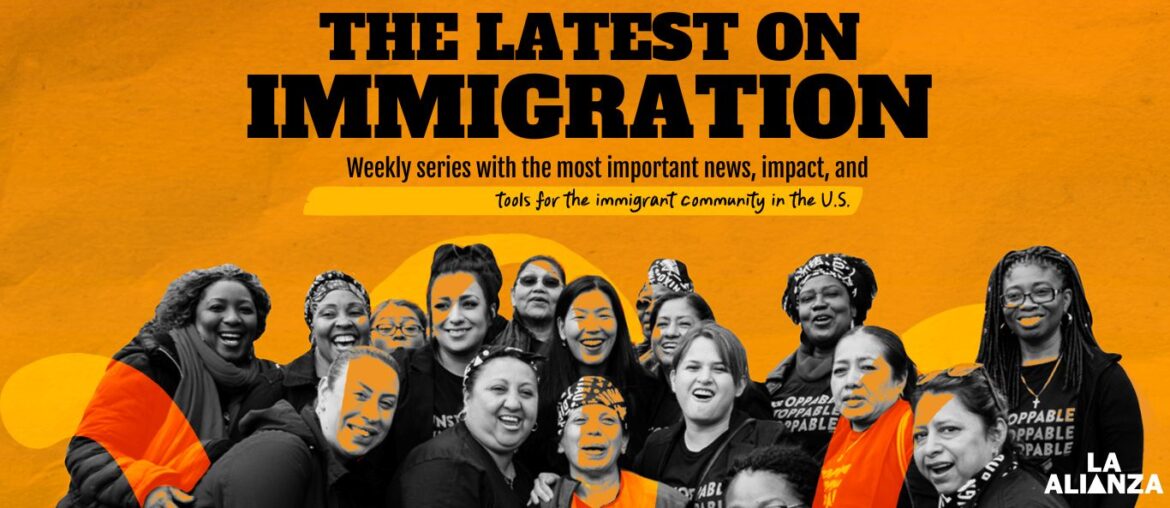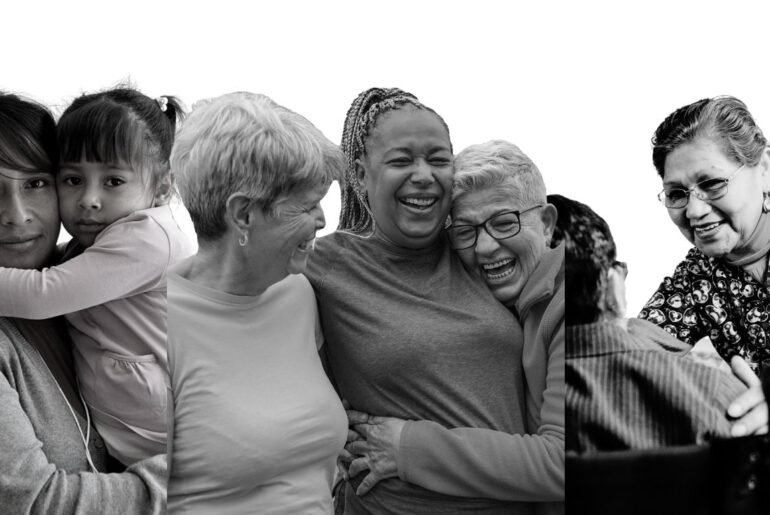This is a summary of the most important immigration news from February 19 – 26, 2025. During this period, the Trump administration has taken measures such as increasing detentions, proposing changes in legal aid for migrant children, and promoting state laws to strengthen cooperation with ICE. Communities and organizations have reacted to these measures in a variety of ways.
Recent News
Raids in courts and during immigration appointments: The Trump administration authorized Immigration and Customs Enforcement (ICE) to carry out operations in immigration courts and during mandatory immigration check-in appointments, which has led to the detention of numerous people who were compliant with their legal proceedings.
- What we know: Immigrants who attended immigration hearings or appointments were detained and deported. ICE has set daily arrest quotas, pressuring agents to target those who voluntarily show up. Furthermore, the end of the ban on courthouse detentions could affect the judicial system by discouraging witnesses from testifying and victims from reporting crimes.
On February 11th, Jhojan Cano Espinal, a domestic worker and immigrant from Colombia, reported that his partner, Juan Felipe Velásquez Ramírez, was detained by ICE during a routine check-in in Cedar Rapids and placed under expedited deportation proceedings despite having a pending asylum claim, in which he alleges he was persecuted in Colombia due to being a member of the LGBTQ community. The non-profit Escucha mi Voz (Listen to my Voice) issued demands to press for political intervention; however, Velásquez was transferred to a detention center in Texas, where his asylum petition was denied.
- Why this is important: This strategy makes attendance at appointments and hearings problematic, which could lead to more deportation orders issued in absentia and undermine trust in the judicial system.
- What you can do: Seek legal counsel and know your rights. The American Civil Liberties Union (ACLU) has a practical guide about immigrant rights, including what to do if you are stopped by Immigration and Customs Enforcement (ICE) officers.
- Impact on immigrant communities: A rise in the fear of going to hearings and courts, which could result in less reporting and less cooperation with the justice system.
Cancellation of legal aid programs for migrant children: Initially, the government had suspended a $200 million contract to provide legal aid for unaccompanied migrant children, which left more than 26,000 minors without representation in their deportation proceedings. However, a few days later, the Trump administration reversed the measure and allowed legal services to resume.
- What we know: The initial order caused a fierce backlash from human rights organizations and immigrant advocates, leading the government to reverse the suspension without explaining its reasons. Legal aid organizations can now resume their activities.
- Why this is important: Access to legal representation is essential to ensure due process for children in immigration proceedings. The uncertainty around the program has raised concerns about its future.
- What you can do: Seek support from specialized organizations and be alert to possible changes in policy.
Partial revocation of TPS for Haitians: The Trump administration ended Temporary Protection Status (TPS), revoking the extension and redesignation granted by the Biden Administration, affecting more than 500,000 Haitians, which means that they will lose their work permits and will be at risk of deportation after August 3, 2025.
- What we know: The Department of Homeland Security (DHS) announced that TPS for Haitians will expire on August 3, 2025, six months ahead of schedule.
- Why this is important: The elimination of TPS affects thousands of people who have lived in the United States for years and who now face the uncertainty of deportation.
- What you can do: Seek legal advice to find out what options are available and to evaluate alternatives for regularizing your immigration status. You can also access the Deportation Defense Manual developed by Make the Road NY, by clicking on this link: https://maketheroadny.org/we-protect-us/.
Massive firings in the Department of Homeland Security (DHS): More than 400 DHS employees were fired as part of federal government restructuring.
- What we know: The firings include staff from the United States Citizenship and Immigration Service (USCIS), FEMA and CISA, which could affect the speed of processing immigration petitions.
- Why this is important: The staff reductions could further delay adjudication of applications for asylum, work permits and permanent residency, among others.
- What you can do: Check with lawyers about possible delays and seek updates on immigration proceedings.
- Impact on immigrant communities: Increase in wait times for immigration applications.
Developing Stories and Local News
These are stories and legislation that are developing or in the pipeline. Details could change.
- HR 32: This bill seeks to restrict federal funds to states and localities that don’t cooperate with deportation operations, except for cases involving victims of and witnesses to crime. Over 160 organizations have expressed their opposition, pointing out that it would affect essential services. Congress will vote on the bill this week.
- Indiana: The Indiana House of Representatives passed a bill that penalizes businesses that hire undocumented immigrants. However, it still needs to be taken up by the state’s senate and signed by the governor to become law.
- Alabama: House Bill 7 (HB7) advances. This bill authorizes local police agencies to sign agreements with federal agencies. This legislation would allow state and local officers to detain, investigate and transfer individuals suspected of being undocumented, turning these officers into de facto immigration officials.
- Florida: Governor Ron DeSantis announced agreements with ICE to train state officers on deportation.
- Iowa: The Iowa House of Representatives is analyzing House Bill 187 (HB187), which would require local agencies to collaborate with ICE in the detention of people without legal status. The proposal would allow local police to act under the federal 287(g) program, execute arrest warrants and interrogate at jails. Currently, no agency in Iowa participates in this program.
- Citizens of Venezuela sue the government for canceling TPS: A group of immigrants from Venezuela filed a lawsuit against the Trump administration after it eliminated Temporary Protected Status (TPS). The lawsuit argues that the revocation of TPS, which affects more than 600,000 Venezuelans, was driven by racial discrimination and violates constitutional rights.
- Government pushes self-deportation campaign: The Department of Homeland Security (DHS) launched a publicity campaign to urge undocumented immigrants to leave the country voluntarily. The campaign includes ads in social media, television and radio in several languages, both inside and outside the U.S.
Immigration in numbers
- The number of immigrants in ICE detention centers increased from 39,238 to 41,169 in February. Of the 4,422 new people detained in the first two weeks of the month, 41% of them did not have criminal records.
RESOURCES
- For more help, visit the National Domestic Workers Alliance’s “Know Your Rights” hub. It includes immigrants’ rights, immigration options, and a legal aid directory, among other resources. To access the information, visit ndwa.us/immigrant.
Note: The National Domestic Workers Alliance is the partner organization of La Alianza
- To identify reliable information, visit: How to identify fake news about immigration and avoid misinformation.
Legal Disclaimer: This information is provided for educational purposes and does not constitute legal advice. It is recommended that you consult with an immigration attorney to assess your specific situation.
Editor’s note: This article was originally written in Spanish and translated into English by Tilde Language Justice Cooperative




